Covid: Ban on meeting in houses extended across Scotland
- Published
- comments
Nicola Sturgeon announces extension of ban on meeting in houses
A ban on visiting other people's homes is to be imposed across Scotland, First Minister Nicola Sturgeon has announced.
The measure is already in place for more than 1.75 million people in Glasgow and some neighbouring areas.
But Ms Sturgeon said it would be rolled out across the whole of Scotland from Wednesday in a bid to get the virus under control again before winter.
She also confirmed that Scotland would be following England in imposing a 10pm curfew on pubs and restaurants.
The curfew will be in place from Friday - with Ms Sturgeon warning that any premises that do not comply could be shut down completely.
Indoor and outdoor gatherings in Scotland were restricted to six people from two households just two weeks ago.
However, the number of people testing positive for the virus has continued to increase since then - with the average number of new cases every day now reaching 285, compared to only seven a day in July.
The 383 new cases confirmed on Tuesday was the highest daily total since 15 April, and the sixth highest since the outbreak began in Scotland.
The first minister said hospital and intensive care admissions were also starting to rise, with more older people testing positive.
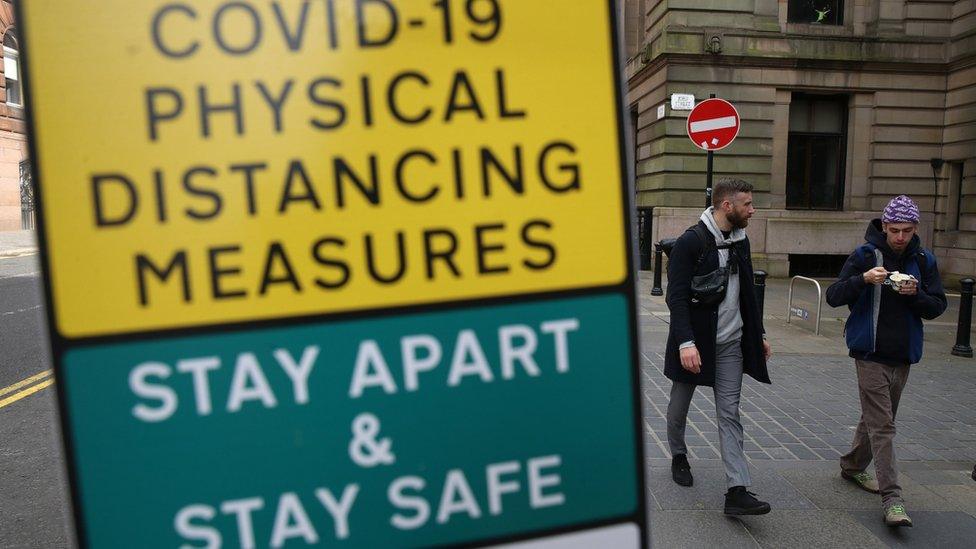
She said the country therefore had to go further to prevent the virus spreading unchecked, and that the scientific advice was that household interaction was a "key driver" of transmission.
Ms Sturgeon said the Scottish government had therefore decided "after careful consideration" that visiting other people's homes will no longer be permitted.
The move means Scotland will have tougher coronavirus restrictions than England - where people can can still meet in groups of up to six in a house.
She said: "One of the reasons we have decided to do this is that our early data suggests this restriction is starting to slow the increase of cases in the west of Scotland.
"So if we extend it nationwide now, in an early and preventative way, we hope it will help to bring the R number down and the virus back under control."
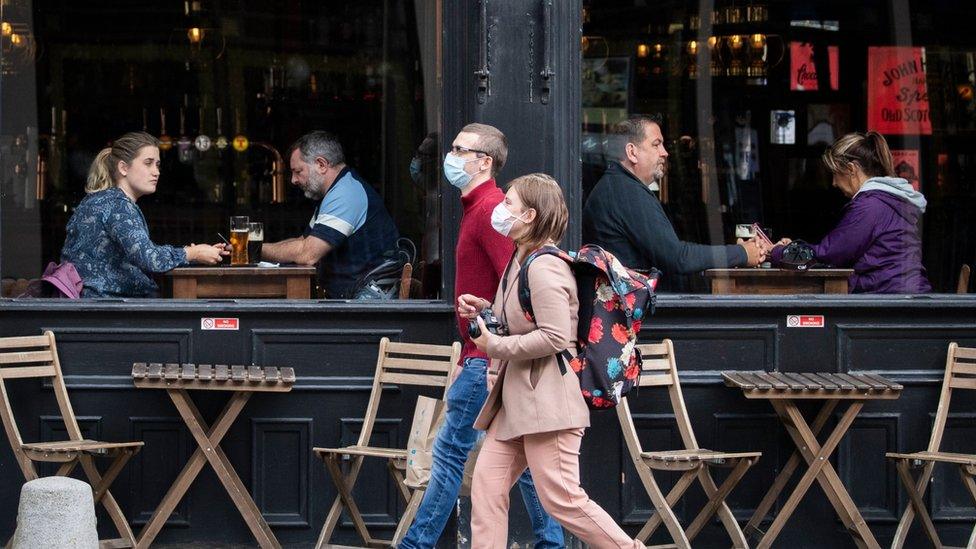
Regulations enforcing the changes will come into place from Friday, but Ms Sturgeon said everyone should comply from Wednesday.
The first minister said the new restrictions on visiting other households would be reviewed every three weeks - and stressed that they will "not necessarily" be in place for as long as six months, as some reports have suggested.
There will be exceptions for those living alone, or alone with children, who form extended households.
The rules will also not apply to couples who do not live together, or to tradespeople or for the provision of informal childcare - such as by grandparents.
Meetings in public indoor settings - such as pubs and restaurants - will continue to be limited to a maximum of six people from two households.
And up to six people from two different households can continue to meet outdoors, including in private gardens.
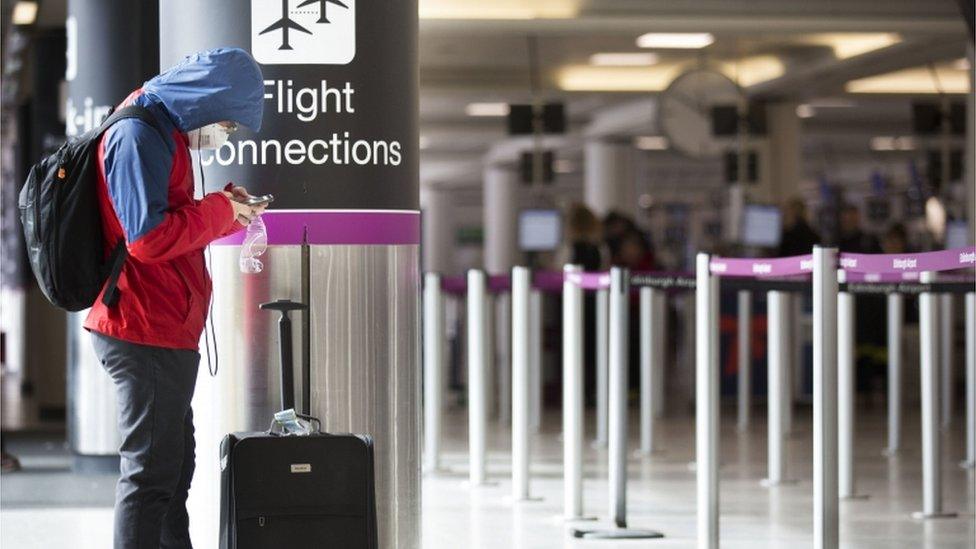
Ms Sturgeon urged people not to book foreign trips during the October holiday
However, children under the age of 12 will be exempt from both the limit of six and the limit of two households if they are meeting outside.
And young people aged between 12 to 18 will be exempt from the two household limit - so will be able to meet outdoors in groups of up to six.
Ms Sturgeon acknowledged: "The measures I am announcing today are tough - I will not pretend otherwise - but they do not represent a full-scale lockdown of the kind imposed in March.
"Indeed, today's measures are an attempt to avoid another lockdown.
"By acting early and substantially, our hope is that these new measures will be in place for a shorter period than would be the case if we waited longer to act."
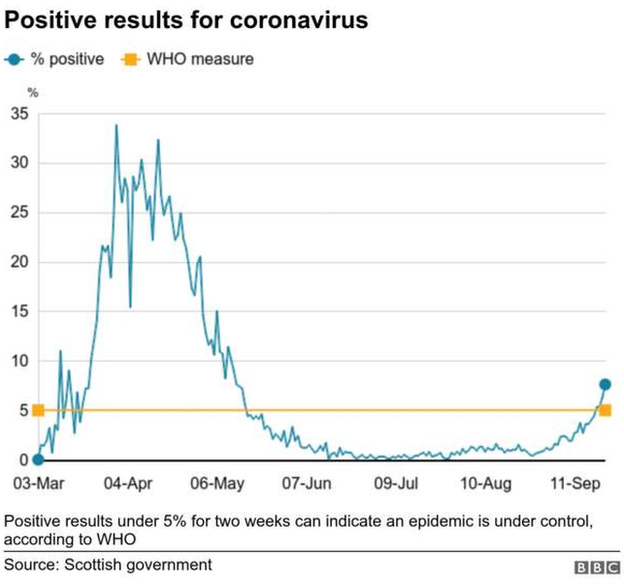
The first minister said she was keeping the option of a so-called circuit breaker - a short period of nationwide lockdown, potentially during the October holiday - under review.
She urged people not to book overseas travel for the October break "unless it is absolutely essential", and advised against car sharing with people outside your own household.
Ms Sturgeon made her statement to the Scottish Parliament shortly after Prime Minister Boris Johnson outlined new measures in England in the House of Commons.
The two leaders and their counterparts in Wales and Northern Ireland have held talks over a UK-wide approach over the past 24 hours.
Both the UK and Scottish leaders made television broadcasts to the nation on Tuesday evening.
Prime Minister Boris Johnson called on the public to "summon the discipline and the resolve" to follow the new rules, warning the government may go further if people do not stick to them.
Mr Johnson said while the vast majority have complied with the measures so far, "there have been too many breaches".
Immediately afterwards, Nicola Sturgeon said the latest restrictions may feel like a "step backwards", but urged Scots to stick with them anyway, insisting they "will make a difference".
She said: "Please know that thanks to all your efforts over the last six months, we are in a much stronger position than in the spring."
The day's announcements came after the UK's Covid-19 alert level moved to 4, meaning the virus is "high or rising exponentially".
What has the reaction been?
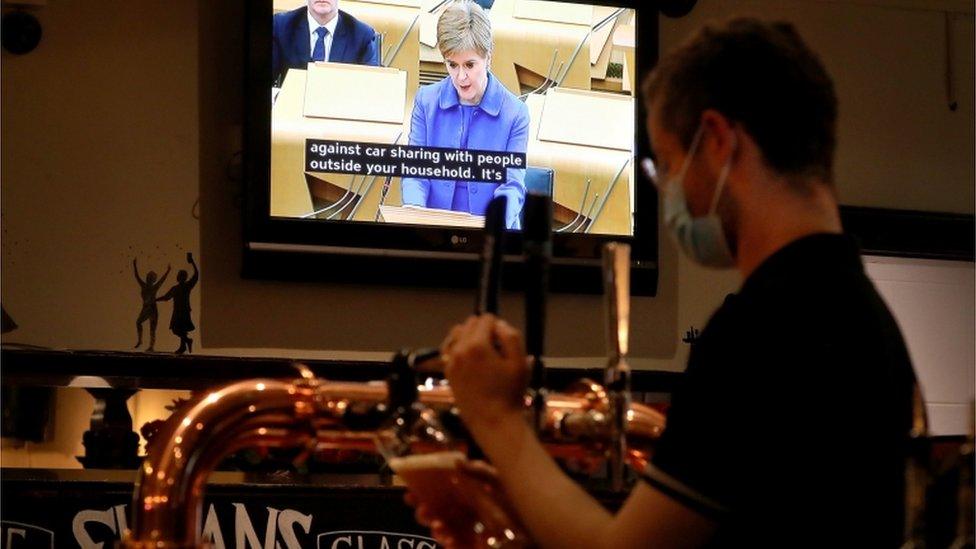
The licensed trade has warned that forcing them to close at 10pm could lead to further job losses
Stephen Montgomery of the Scottish Hospitality Group, which represents more than 50 pubs and restaurants, accused Ms Sturgeon of "singling out" the industry despite "very little evidence" that it is linked to the spread of the virus.
He said: "With 90,000 Scottish jobs at risk we are heading towards a cliff edge and time is running out.
"We have been speaking with government and that will be ongoing but there is only a matter of months before the restrictions on our industry will have irreparable long-term damage on our sector."
The Scottish Tourism Alliance said the curfew on pubs and restaurants was "likely to be the last straw for many businesses which were only just managing to break even".
The Scottish Chambers of Commerce warned that "stricter measures in Scotland are undeniably more dangerous for the survival of businesses" and called for more support to be given by both the Scottish and UK governments.
The Conservatives said the Scottish government had only hired 874 contact tracers so far, despite saying in May, external that 2,000 contact tracing staff would be required to "deliver a sustainable service across Scotland".
Scottish Labour leader Richard Leonard said it was clear that Scotland's test and trace system was "not working" and that "too often the system is overwhelmed".


The new Scottish restrictions are more extensive than those announced by Boris Johnson for England.
Nicola Sturgeon has matched the prime minister by introducing a 10pm curfew for bars and restaurants.
Table service and some of the other new requirements for England already apply in Scotland.
In her Holyrood statement, the first minister said she was aligning with other UK nations "as far as possible".
She also said her scientific team had advised that the UK government's package "on its own will not be sufficient" to bring coronavirus under control.
The Scottish government's gone significantly further by extending the West of Scotland ban on visiting others in their own homes nationwide.
Nicola Sturgeon said the new rules would be reviewed every three weeks and need not all last for six months - which was the timescale Boris Johnson suggested for his measures.
All governments intend to back up their policies with enforcement but there has been no mention of big new fines in Scotland.
This is devolved decision making in action in the biggest crisis since the creation of the Scottish Parliament.
Some argue divergence across the UK is confusing and undesirable but opinion polls consistently suggest the Scottish public trust Holyrood to set the pace.


Use the form below to send us your questions and we could be in touch.
In some cases your question will be published, displaying your name, age and location as you provide it, unless you state otherwise. Your contact details will never be published. Please ensure you have read the terms and conditions.
If you are reading this page on the BBC News app, you will need to visit the mobile version of the BBC website to submit your question on this topic.